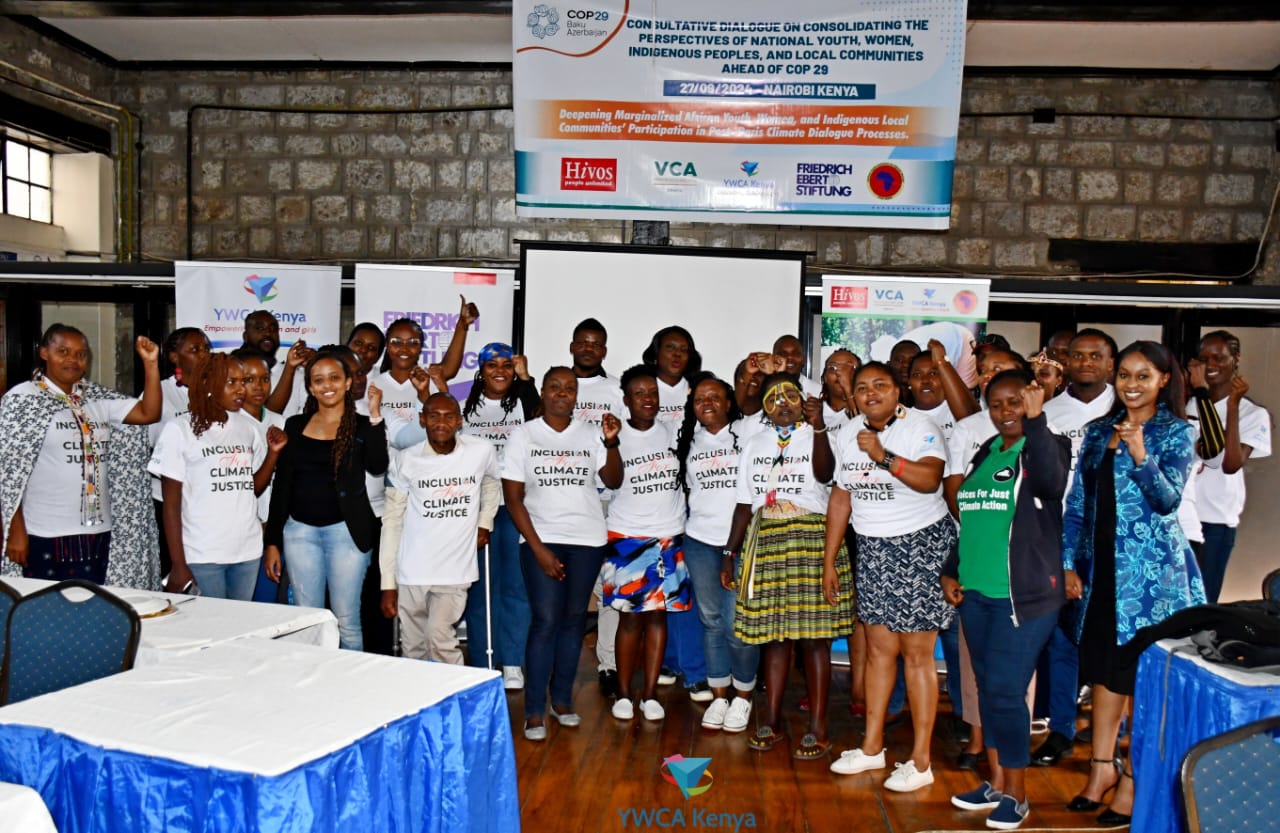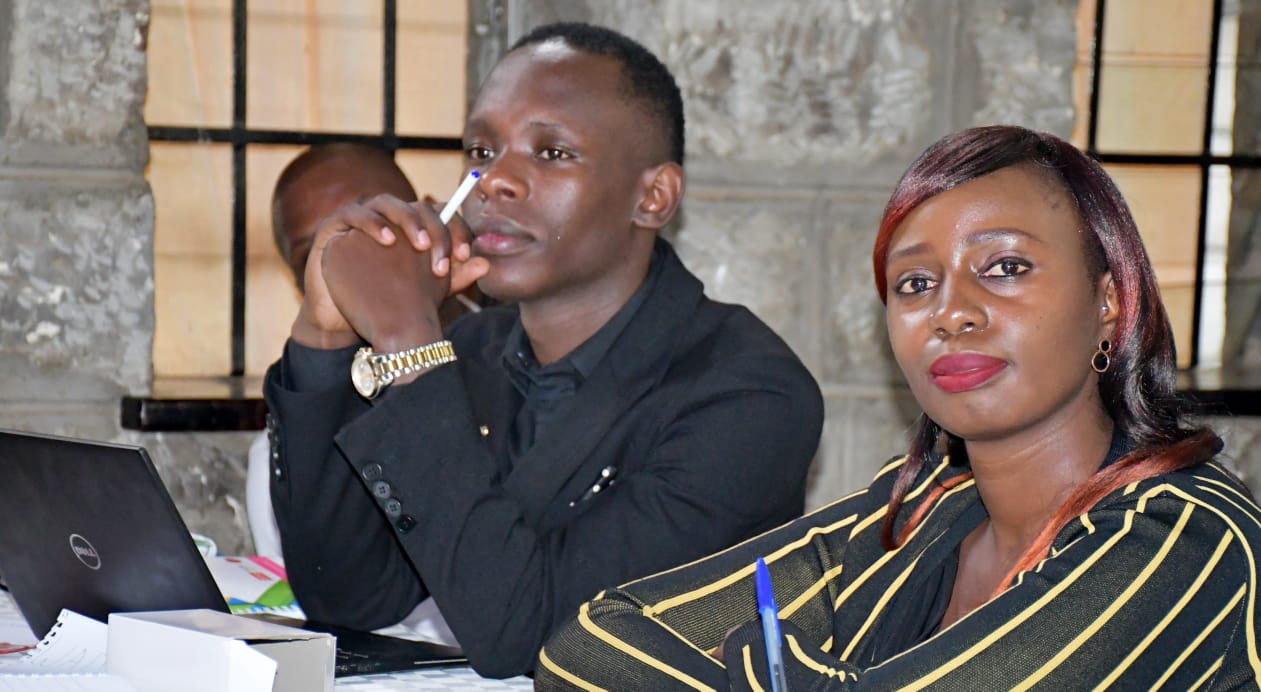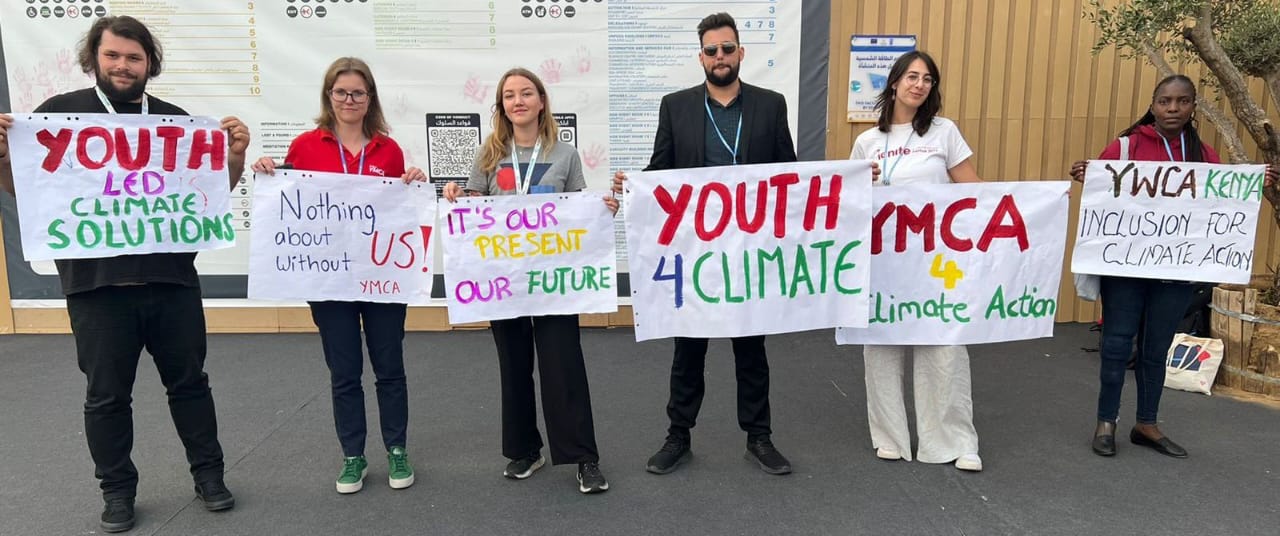YWCA calls for Inclusivity of Marginalized Communities

A consultative meeting consisting of youth, women and marginalized communities at the YWCA headquarters in Nairobi on 27th September. PHOTO: YWCA
Marginalized communities being at the front line of climate impacts posses unique experiences that are critical in developing resilient and sustainable adaptation practices geared towards mitigating the effects of extreme weather events.
In an indoor consultative meeting aimed at deepening the role of the marginalized African Youth, women, indigenous communities to enhance climate resilience, held by Young Women Christian Association (YWCA) in their Nairobi headquarter premises on September, 27, 2024, Collins Diof Oloo, a resident of Suba and the founder of Mema Organization, a community based organization, that deal with environmental conservation and climate justice, voiced his concern over some of the drastic challenges the Suba North and South community undergo.
On his part, the organization centrally placed in a very marginalized and remote area instigated their urge to do thorough sensitization on climate change to impact knowledge regarding climate change.
“We are dealing with mass education more so on young people and women.Other than doing sensitization on climate change, we have to an extent stretched our wings to cover topics related to menstrual hygiene and mental health so that we can also include women to have a voice and to be heard by the policy makers and the society at large,” Oloo detailed.
They are keen on educating the Gen Z, an emerging youth led wing to bring about a synergy in voicing raised concerns on climate justice ahead of the “Finance COP29.”
Additionally, Oloo called on the government to consider including the youths to shape climate related policies that will cater for the interests of the abandoned group which according to him, encompassed women, marginalized communities and youth. This is by drafting a clear way in which the youths can also be included in the high table where policies are made.
“The government should draft a way that upcoming organizations can also directly benefit from climate change allocated funds, if the government does this, then it will be a positive move and a spirit of good will.”
Suba has been experiencing low rainfall as a result of increased deforestation, this has led to successive drought that has left the land unproductive.
“We have seasons of planting but our land in no longer productive, we are working on regaining back the fertility of our land, however long it will take, I know will get there,” Oloo added.
Drought and famine that has invaded Suba in the past few years have also affected fishing as the main economic activity in the region.

The Suba CBO founder denoted that because of the lower volume of water, fish have migrated to other water bodies and water catchment areas in Uganda. This has subsequently hindered fishing activity as the main source of income.
A recent tour made by our team in Suba has established that the drought condition has hugely affected women. Majority of women in that region are unemployed, with regards to this, they are solely depending on farming and fishing as the main source of livelihood. It has been a great challenge as this has not been the case, the land is never productive, intense sun rays dehydrates most of the women who often spend better part of the day to till their land.
There has been close to inadequate food security owing to the fact that conditions of proper food production have been unfavourable because of the drastic climate change events.
READ ALSO:
In a recent report released in 2024 July, by International Journal of Multidisciplinary Research and Publications, drought in Suba Sub County rocketed the price of grain in the market, reduced farm produce and affected livestock health.
Safe domestic water was also denoted to become scarce during drought, livestock pastures disappeared and small businesses suffered due to shortage of money by the residents to spend.
From the report, participatory listing and ranking of severe climate related
events in the mentioned sub county included drought, livestock diseases, domestic water, and severe diarrhoea in children.
The report also revealed organizations that rally residents to introduce drought resistant crops, introduce small livestock such as sheep and goats due to inadequate pasture for grazing, planting fruit trees and grazing near the lake shore, and planting vegetable and tuber crops near the lake shore.
Similarly, a report on the Kenya Drought Response Dashboard, 2023, detailed that 2.9 million people, 68 per cent of the target, received some form of assistance from January to December under the 2023 Drought Response for Kenya. More than one million people received food and livelihood assistance, translating to 51 per cent of the proposed target.
From the report, humanitarian partners reached more than 490,500 people with nutrition assistance caused by drastic effects of the climate change. This included supporting more than 250,250 children with moderate and acute malnutrition, 101,000 children with severe acute malnutrition and 139,000 pregnant and lactating women with acute malnutrition.
But what does COP29 has in store for the marginalized communities?
COP29, which will be held in Baku in Azerbaijan, aims at discussion and coming up with resolutions and findings on the need for quicker, simplified access to climate finance for developing countries.
Some of the thematic area of focus include finance, investment and trade, science, technology, innovation and digitization, human development, children and youth, health and education, nature and biodiversity on indigenous people, and gender equality.
YWCA, a non-state organization is solely pushing for a critical focus on climate justice and equity. On climate finance for instance, the organization is calling on increased access to climate finance to support adaptation and mitigation efforts that are aligned with climate resilient priorities. Additionally, the association is calling on respect to culture and ecological values.

Other pressing issues include advocating for establishment of a dedicated financial mechanism to address loss and damage, and a just transition to a low- carbon economy that respects the rights, protects livelihoods, and preserves cultural heritage.
In a positional paper seen by the times.co.ke, YWCA has channeled a raft of proposals to the government ahead of the COP29. Some of the considerations, considering the NDR report that estimates climate finance needs for developing countries between 5.8 to 5.9 trillion dollars by 2030, the association suggests a higher amount per year. In their submission, they have called on the government and the rest of the parties to consider setting sub goals to mitigation, adaptation and loss and damage.
Given the context of the socially marginalized groups like the indigenous people and local communities landscapes and ecosystems, in connection to evidence of loss and damage caused by drastic effects of climate change, the association urged the government to undertake risk assessment and have a recommendation to other parties to include in their nationally determined contributions.
On gender, considering the common understanding to review the gender action plan, the association has also submitted for consideration by the Kenyan government in its position a financial deliberation to reviewing the gap with intentions of enhancing women and the socially and structurally marginalized representation, capacity strengthening, knowledge sharing, and communication, and gender responsive implementation.





